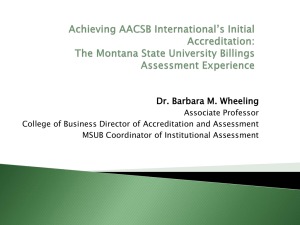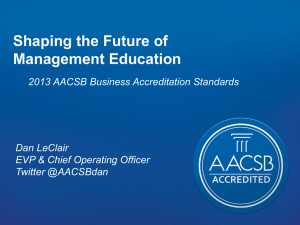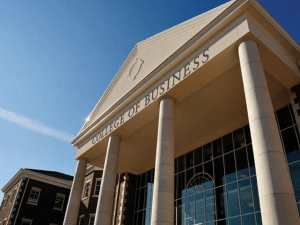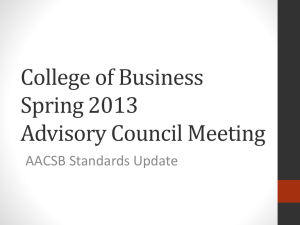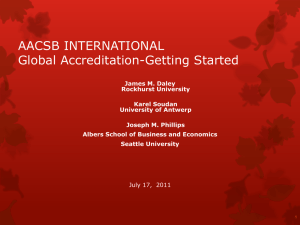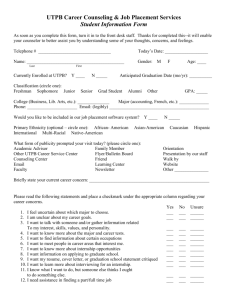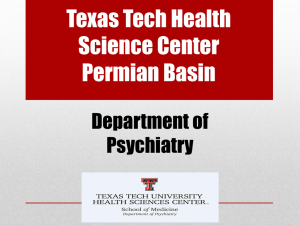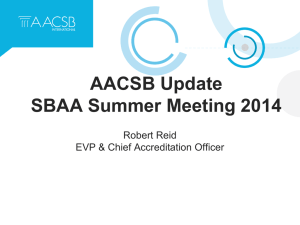Strategic Plan - The University of Texas of the Permian Basin
advertisement
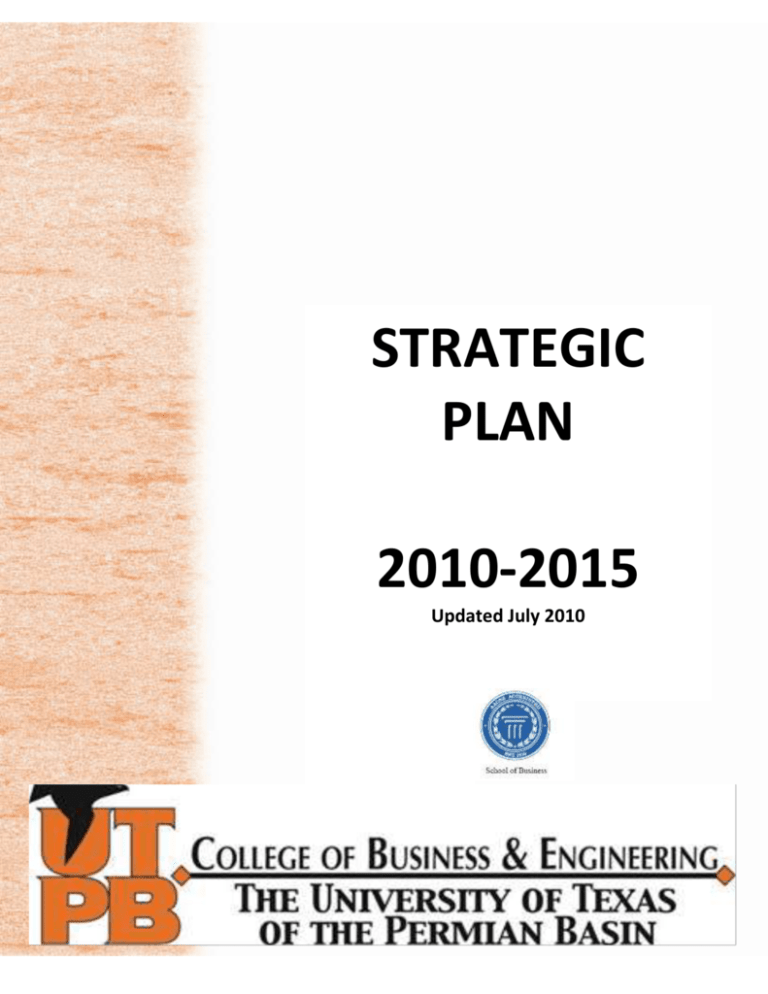
STRATEGIC PLAN 2010-2015 Updated July 2010 1 OUR VISION …while never losing sight of the fact that our primary focus is to serve the Permian Basin region, we seek to advance our baccalaureate and graduate degree programs through continuous improvement to a level that students beyond the region will see us as a viable educational option. MISSION STATEMENT The College of Business and Engineering (COBE) mission statement was last updated in Spring 2008 after discussions and recommendations from the various stakeholders. We consider the three part amplification to be a complementary part of the mission – it is advertised as such. COBE Mission Statement The mission of the College of Business and Engineering at The University of Texas of the Permian Basin is to offer both undergraduate and graduate educational programs that are high quality and evolve with our ever changing economy; to foster the success of our students in their professional careers; to promote our community of scholars’ excellence in teaching, intellectual contributions, and service; and to advance economic development within our region. Amplifications to the mission: To Our Students: The College of Business and Engineering seeks to create an academic environment in which teaching and learning are emphasized and enhanced through distance learning and instructive innovations. We value each student as an individual and will provide that personalized attention to all qualified students from admission, through classes and on to their professional career recruitment. All programs, while specifically geared to meet the uniqueness of our traditional and nontraditional students, will ensure all of our graduates are competitive in the global economy. To Our Faculty and Staff: The College of Business and Engineering seeks to foster continuous professional growth for our faculty and staff. We are dedicated to assisting our faculty and staff in remaining marketable—the best faculty members a university can have are those that would be sought by other universities. Thus, the College of Business and Engineering sees its responsibility as keeping these highly qualified professionals 2 motivated to stay. Through their motivation, the College of Business and Engineering will be recognized as a center of excellence. Efforts of our faculty and appropriate rewards thereby will be focused proportionately in three key areas: Teaching Research Service 40-60% 25-35% 15-25% To Our Community: The College of Business and Engineering recognizes its responsibility to help advance the economic base of the Permian Basin and West Texas. By serving as a resource of intellectual, social, economic and technological advancement, College of Business and Engineering serves as a valuable research asset for the region’s economic development. Our greatest contribution is to provide well-prepared graduates to West Texas employers and instill a life-long love of learning. Core Values: We understand our responsibility as the primary provider of baccalaureate business education to the students in Permian Basin and West Texas. We are committed to academic excellence We recognize that students and effective teaching are our primary concern and are committed to providing an individualized approach to meeting each student’s needs We foster the idea of continuous improvement in each component within the College of Business and Engineering We firmly believe that ethical behavior both from the faculty and staff as well as future graduates is of utmost importance We hold that mutual respect for all members of our academic community including external constituents is a necessity We are committed to effective and efficient use of educational and technological resources We embrace our role as a resource for meeting the needs of the business community of our region We involve and encourage participation from all of our constituents to actively participate in the planning and implementation of our programs We support innovation in the classroom, research and our outreach into the local community We embrace all forms of diversity in students, faculty and staff We recognize the importance of understanding and using technology by our students in the future marketplace 3 We understand our role in improving written and oral communication, reasoning, quantitative and qualitative analysis, and integration of functional knowledge Our mission statement was established in 2003 before our initial AACSB accreditation and emphasized the relative importance of teaching, intellectual contributions and service. As part of a regular review cycle the faculty, students, and community leaders are asked for input concerning the mission. Minor changes occurred in 2005 and in 2006 the last word was changed from Texas to “region” as a service area. Then in 2008 the mission statement was amended to further clarify and emphasize the importance of teaching for our College of Business and Engineering. Both UT Permian Basin and the College of Business and Engineering have a primary emphasis on quality teaching with an expectation for faculty research and service. As the primary College of Business and Engineering within the Permian Basin we recognize that our principal area of responsibility is that of providing high quality undergraduate classroom instruction. Likewise, since we are also the key provider within this area for master’s programs, we also have an inherent responsibility for our faculty to remain current in terms of their intellectual efforts. Further, because we were uniquely positioned within this region of West Texas, we recognize our responsibility to our communities to be a resource for economic advancement. We also recognize that we have a responsibility to our faculty to support their needs to be well rounded in each area. The College of Business and Engineering, therefore, has established policies to address the relative weights given to each dimension. We further recognize that each faculty is gifted more in certain areas. By recognizing these differences we have established goals for the collective faulty of 55, 30, and 20 for teaching, research and service respectively. The Dean adjusts the proportion to achieve the best advantage for each faculty member thereby providing faculty with some ability to suit individual interests. This mission statement has been prominently displayed in key COBE areas for the past ten years as a reminder to faculty, staff, and students. The mission statement continues to be aligned with the mission statement of the university as well as the University of Texas System. 4 PROGRAM OBJECTIVES FOR THE COBE PROGRAM OBJECTIVES ASSESSMENT ACTIVITY 1. The School will continue to be actively involved in the University’s student recruitment efforts. The School will strive to grow at the rate of 5% per year in student headcount and SCH production or to match the growth of the institution as a whole. The School will implement and expand specialized tracks. 1. The School’s Coordinator of Business Studies and the Dean’s Office will participate in student recruitment activities with the Office of Admissions. Activities may include Freshman Orientation and Falcon Days plus developing relationships with junior colleges. Develop ways to introduce new programs. 2. The School will continue to maintain the level of accreditation quality that is expected by AACSB International and continue toward accreditation of the technology program. The School will continue efforts at improving programs and assessment efforts to fully satisfy the AACSB standards. The School will finalize AACSB maintenance visit plans. The School will initiate accreditation procedures for the new mechanical engineering program. It will attract and hire appropriate program faculty. 2. Supporting accreditation: The Assessment Committee will complete plans for re-accreditation in business and begin initial accreditation in engineering. The accreditation plan will show marked improvement as it matches each assessed area. The School’s AACSB plans will be fully accepted by the agency. Initial plans for engineering will be in place. 3. The School will continue to actively cooperate with all programs of the University that focus on student retention. 3. The School will maintain contact with all student support functions on campus, and will provide information to students as to the availability of such services on a needs basis. 4. The School will continue to fund activities that will enhance faculty development and research opportunities. 4. Faculty will all be academically or professionally qualified while the quality and quantity of publications will increase. 5. The School will continue its partnership 5. with the University of Texas TeleCampus. The School will participate in assessment discussions with other UT components regarding the MBA Online. 5 The Dean and other representatives to the academic council for MBA-O will bring recommendations from that body to the graduate faculty for program adjustments. SUPPORT FOR MISSION Specific action items for the immediate future to support the mission follow. GROWTH AND RETENTION a) The COBE “business side” experienced an overall headcount increase of 5 percent (675) for Fall 2008 over Fall 2007. Unfortunately, there was a 3 percent decrease for Spring 2009 (641) over Spring 2008 and a 3 percent decrease for Spring 2010 (624) over spring 2009. This may be attributed to the increased SAT score requirement for entering students. b) Assurance of Learning (AOL) committee meetings are held monthly to review assessment results and to make an effort to close the loop on the cycle. The process partially occurs at the discipline level where possible. We conduct a faculty meeting bi-annually to review results. c) This has been the fifth year of implementation of the ETS Major Field Test (MFT) as a basic AOL device to measure achievement of student learning objectives. Averages are in line with national averages and are constant. Findings showed growing strength in finance and accounting. The lowest area was Marketing but we have since placed a new coordinator, hired new faculty, started a marketing club and believe performance will now improve. d) Students were surveyed in 2008 to determine what they felt was of greatest value and what could be done to improve the quality. Students felt their greatest skill was their written and oral communication while their greatest weakness was global business. We recently hired 2 professors with international degrees (marketing & finance) and an emphasis on global business research. We developed an international entrepreneurship elective to boost student knowledge in this area. e) The STEPS tracking program was refined by providing training and familiarity for the entire faculty during a seminar in Fall 2008. Course assessment data is entered into the system by a dedicated administrative clerk. Consultant Steve Adams provided advice. f) A formal Honors Ceremony is conducted every April to recognize student accomplishments It is well attended by other students and the community. Students are also inducted into Beta Gamma Sigma during this ceremony. (We received a national award for 2008 as an exemplary chapter). g) The COBE implemented new student clubs for Marketing (MODE) and Finance (Falcon Finance) in addition to existing SIFE and Accounting Business Association (ABA). h) The number of Graduate Assistant slots has steadily increased from one in 2004 to eight in 2009. These are used to reduce faculty workloads in research and 6 course preparation. We also use two undergraduate students to assist with office help. i) A survey of graduates was accomplished during summer 2008 and statistics were compiled into an information booklet. The findings are distributed to our constituents and are incorporated in to strategic plans. j) Specific recruiting efforts accomplished include: 1. A visit to West Texas College in April 2009 to speak with potential students. 2. Midland High School focus group for student needs. 3. High school boot camp to introduce business via Roden Center 4. Several junior college focus groups at UTPB for recruiting and relations with the community. 5. Odessa Chamber of Commerce research study conducted to increase number of students attending university and to determine factors affecting higher education. 6. Lee High School (in Midland) coordination visits to encourage seniors to attend UTPB. 7. Midland College meeting with counselors to coordinate their needs for course transfer. 8. The COBE administrators visited several community colleges to establish letters of agreement making transfer of credit more streamlined. 9. The Oil Show (50,000+ attending) included a booth to represent the COBE. FACULTY DEVELOPMENT a) During the 2009-10 academic year, the COBE lost one finance faculty that was replaced. The COBE is fully staffed with faculty and administrators. b) During the 2008-09 academic year, the COBE lost one marketing faculty but replaced with two more, lost one management faculty that was replaced, and lost an advisor that was replaced. The Chair of Graduate Studies was changed to Dr. Scofield. The COBE is fully staffed with faculty and administrators. c) Implemented the School Reorganization Plan in Spring 2008 by positioning an Associate Dean and three Chairs (undergraduate, graduate, technology). This allows the COBE to better serve students and faculty and allows the Dean to focus more on strategic objectives. d) The faculty continued to publish and create intellectual contributions during the recent 2009-10 academic year at the same pace and all faculty have published at least at the minimum level of two publications each rolling five year period. That faculty member is actively working with others to complete two publications in the Fall semester. The number of acceptable publications maintains steady. e) The number of annual faculty awards was increased by the new Dean as a better way to incentivize faculty performance. 7 f) Dr. Saran has been doing focus groups for ECISD, MISD, Odessa College and has other focus group meetings scheduled to make the public aware of UTPB. g) Administrators attended the AACSB Annual Conference, Dean’s Conference, Maintenance of Accreditation Seminar, and Continuous Improvement Conference. The Associate Dean attended a leadership conference conducted by the University of Texas System. ONLINE PROGRAM a) Four new UT TeleCampus (UTTC) courses for the online MBA were added during the 2009-20 to bring the total to ten courses in Marketing and Finance. b) Three new undergraduate courses were offered for the first time during 2010 to provide more scheduling options to students. c) Two new faculty are now trained in online instruction via the UTTC system. QUALITY INITITATIVES a) New catalog concentrations were added in Energy and Entrepreneurship plus several focused finance concentrations. These not only serve the employer better, but allow the student to be more marketable upon graduation. b) Internships increased from 11 to 16 for the 2009-10 year. All interns are compensated by employer sponsors. c) The Advisory Committee grew in membership as it is now headed by the Texas Railroad Commissioner (regulates the Texas energy industry). d) A new director of the Small Business Development Center was in place during 2009. e) There was an “Innovative Energy Commercialization Opportunity Seminar and the keynote speaker was Henry Groppe – the foremost authority on oil prices. f) The Dean is active in developing outside funding for important programs for the school. As a result of the School Reorganization Plan, the Dean can now engage in building external relationships and possible funding sources. g) Admission standards (SAT/ACT) is being raised each year for five years beginning in 2009 for the university which improves the quality of entering students. h) TurboTrac grant ($90,000) for work on commercialization of energy saving by efficient transmission. i) The faculty as a whole authored 23 journal articles during the past year. 8 GOALS FOR COBE 2010 – 2011 Short Term Goals (Business, Engineering, Technology) ^ 1. 2. 3. 4. 5. Faculty and COBE records and stored on O Drive * Faculty Handbook updated ** Intellectual quality improvement – research seminars ITEC lab tech position # Engineering secretary position # 2010 – 2015 Long Term Goals 1. AACSB Maintenance February 2011. 2. Fill full-time faculty position for management. 3. Student SCH growth rate in Business averages of 5% per year. 4. Business faculty intellectual contribution growth in quality. 5. Expansion of business classrooms (after new classroom building). 6. Dedicated computer labs for Business. 7. Online degree completion available – BS in Business. 8. Operating funds increased to support growth. ^ 9. Faculty development fund increase to support growth. ^ 10. Endowment fund of $10,000 and grants increased significantly. ^ 11. Offer faculty classes to improve pedagogical skills ^ 12. Community outreach initiatives (SBDC, Roden Center, energy studies) ^ 13. External stakeholder involvement increased (alumni, Advisory Cmte, assessors)^ 14. ABET Initial accreditation for technology in 2011. # 15. ATME Initial accreditation for mechanical engineering in Fall 2011. # 16. Student SCH growth in Technology and Engineering averages of 5% per year # 17. Fill faculty positions – mechanical-1, petroleum-1, and nuclear engineering-1 # Footnotes for goals: All goals were developed in Spring 2010 by College of Business and Engineering Strategic Planning Committee and reviewed in detail by the faculty. ^ applies to Business, Technology, and Engineering # Applies to Technology or Engineering goals only * The O drive should include all faculty PRJ publications since 2005 (later other faculty publications), faculty vitas, syllabi, course assessments, committee minutes. Difficulty if not available as electronic copy from the publisher. To be managed by faculty clerk. ** The faculty handbook will need revisions. Consider: a) grants as part of AQ qualification, b) appeals process, c) definitions, d) promotion to full prof., e) provisions for engineering promotion if accelerated. May look at office hours definitions in relation to P/S and online teaching. 9 AACSB PROGRESS UPDATE The status of Maintenance Review Issues Identified by AACSB Peer Review Team during our Initial Accreditation visit in December 2005 is noted below. The team required the COBE to include in each of its next five Annual Maintenance Reports progress on the strategic management of available resources, including implementation and results of the strategies over the previous year on existing action items. These action items are stated below exactly as worded in the exit letter. The Standards noted refer to the “old standards” which, of course, were changed in late 2006. The action items and current status are: 1. Academically Qualified/Professionally Qualified faculty definition and intellectual contributions (Standard 10: Faculty qualifications). 2. Continued refinement of an Assurance of Learning (AOL) plan (Assurance of learning standards 1520). 3. Changes in programs and/or new program development (Standard 4: Continuous improvement). In the Spring of 2008, the College of Business and Engineering engaged a consultant to come to the UTPB campus and make an assessment concerning continued compliance with AACSB Standards. The consultant encouraged the faculty to revisit definitions for AQ & PQ faculty. The Faculty/Staff Committee for the College of Business and Engineering took up consideration of the definitions and recommended changes to the faculty. After much deliberation the College of Business and Engineering faculty adopted several resolutions clearly defining AQ and PQ faculty. In July 2007 the COBE had a new Dean in place and the University stepped up work on a SACS reaffirmation visit scheduled for spring of 2010. In conjunction with these changes the COBE AOL Committee of the College of Business and Engineering proposed a new and significantly expanded Assurance of Learning plan that was adopted by the faculty of the COBE in 2007. In addition, UTPB administration approved the purchase of Student Tracking, Evaluation, and Portfolio System (STEPS) to manage the new plan. In 2008 the Dean and Associate Dean of the COBE attended an AACSB AOL seminar in Tampa, Florida. As a result of this Seminar, the AOL Committee was asked to revisit the school’s AOL plan and the Committee proposed a more streamlined plan that was significantly easier to implement than the plan adopted in 2007. The faculty adopted the new plan after careful consideration. The plan adopted in 2009 has been implemented, new learning objectives have been assessed, results reviewed and changes made based on results. The UTPB College of Business and Engineering has not added any new business discipline majors. In an effort to better serve the needs of the Permian Basin region and 10 4. There is an immediate and critical need for: (Standard 8: Staff sufficiency - student support) a. No fewer than 1 additional fulltime staff support person for the College of Business and Engineering b. Appropriate separate work space allocated for a copy/fax/mail room that does not interfere with College of Business and Engineering ongoing operations 5. Despite having an extremely diverse faculty, increasing the percentage of Hispanic faculty will help the College of Business and Engineering advance its ability to serve its students (Standard 7: Student retention, Standard 9: Faculty sufficiency and Standard 4: our students we have added electives to permit students to pursue certain career interest through tracks inside our existing business degree programs. We have added tracks in energy, finance and entrepreneurship. Through our Roden Center for Entrepreneurship we have also added a minor in entrepreneurship for students not pursuing a degree in Business. The College of Business and Engineering has also implemented other programs to broaden student and faculty learning opportunities. - The Administration provided resources to employ an Administrative Assistant I for the College of Business and Engineering faculty. This position is in addition to the Administrative Assistant II who works in the College of Business and Engineering office and supports the administration for the College of Business and Engineering. The position was created and filled in fall of 2006. In addition, the College of Business and Engineering has been provided resources to employ five Graduate Assistants (four more than during our initial accreditation visit) to assist faculty and help us accomplish our mission. The use of undergraduate student workers has increased in the College of Business and Engineering as well. These students assist faculty and staff by tutoring students, grading, filing, research and a variety of other support duties. The university also afforded us resources for a separate work space for the faculty where the Administrative Assistant I is housed. In this faculty work space is also housed the following: 1) Faculty mail boxes 2) Scantron grading machine 3) High speed black and white printer 4) Color laser printer 5) Xerox copier 6) High speed scanner 7) Icebox, coffee maker and new microwave At the time of our initial accreditation we had one full time Hispanic faculty member. This faculty member is no longer at UTPB. We have been fortunate to hire one new full time Hispanic female faculty member for our Marketing Department. In addition, we have been able to hire several Hispanic adjunct faculty members. Further, The Small Business Development Center has a new Hispanic director who works closely with our faculty 11 Continuous improvement objectives). and students as well as the Permian Basin community. Our faculty as a whole continues to be extremely diverse. Additionally, there are 5 faculty that are recent immigrants from other nations. 6. Given a diverse, bi-lingual, student population, the College of Business and Engineering should pursue more international business exchanges, study abroad programs, course trips, Fulbright awards, etc (Standard 4: Continuous improvement objectives and Standard 15: Management of curricula). 7. The University must expand career services and increase awareness of career services to both BBA and MBA/MPA students. Special attention to the needs of graduate students is essential (Standard 8: Staff sufficiency - student support and Standard 4: Continuous improvement objectives). The management elective part of International Entrepreneurship includes an annual trip to Chihuahua Mexico, however, the trip was cancelled due to civil unrest in that country this year. None-the-less, we have been able to bring in speakers such as a representative of the Governor for that state did visit and spoke to a School class on entrepreneurship. 8. The School should enhance linkages between UTPB business alumni with students for job placement, compensated co-ops and internships (Standard 8: Staff sufficiency - student support and Standard 4: Continuous improvement objectives). There is greater interaction between the Advisory Council and the Student Advisory Group. Conducted a luncheon with business alumni in Spring to enhance interest in all school activities. New offers for student internships are now compensated. Over 80 percent of students are offered and accept jobs in the local area. The Advisory Board has grown in numbers and provided meaningful advice on community expectations for the School. The school employs a professional academic advisor that also assists in Freshman Orientation Days, visits to high schools, and various job fairs in the region. The Entrepreneurship Program also promoted and conducted a small business seminar to induce students to consider a business minor. A recent survey of graduating seniors indicated that 87% of MBA, 88% of Marketing, and 91% of Management students had jobs or were accepted to graduate school upon graduation. A much lower percent of other majors reported jobs. Career Services continues to serve students actively with job placement, on campus interviews, and job search seminars. Special programs such as Career Fairs, Dress for Success, and campus recruiting by national firms are in place. Weekly bulletins are distributed to students showing employers desiring to hire new graduates. Internships are readily available; for example, two accounting firms added interns, Mexco Energy placed two, and Hilton & Stripes Stores added one each. 12 ADVISORY BOARD RECOMMENDATIONS Advisory Committee The College of Business and Engineering has a Business Advisory Council made up 40 successful and respected members of the business community or government. The Council contributes to the development and continuous updating of the School's curricula, faculty, and students and serves as a liaison between academia and the business field. The Advisory Board most recently met in October 2009 and March 2010 to discuss improvements for the College of Business and Engineering. The Committee completed a survey in the fall and indicated: The most important knowledge and skills for their company are: communication skill, problem solving skill, people skills, and time management. The most important ways for the COBE to help businesses in the community are (no clear answer): be more visible, offer more community programs, and internships. The best ways to encourage prospective students to attend UTPB are: promoting the School as social events or meetings, visit local schools, value of education, internships, more promotion. Student Advisory Committee A Student Advisory Council comprises approximately 15 juniors, seniors and graduate students. Both councils meet at least twice a year during each long semester to discuss matters pertinent to their memberships and to the College of Business and Engineering. These bodies are among the constituents involved in the continuous improvement efforts of the School. To improve School recruiting, we should visit high schools and community colleges more frequently. We should also include current COBE students that are past high school / community college students during these visits. The skills, knowledge and abilities most needed when you graduate are: Communication Skills - Oral and written Professionalism and Personal Accountability Critical Thinking and Problem Solving Computer skills 13 Practical Business Standards Business Etiquette Areas of curriculum that need to be improved or added are: Business Ethics-make it mandatory Computer Science for Business-MS Office Classes Business Professionalism Introduction to Business for Freshman-Required Class Finance – Basic Concepts Emphasize the Writing Center Conflict Resolution Independent Study Focus on Small Business 14 STRATEGIC PLANNING COMMITTEE 2009-2010 Jack Ladd, Dean Bill Price, Associate Dean Paul Haensly, Chair Undergraduate Programs Barbara Scofield, Chair Graduate Programs Raj Desai, Chair Technology Leslie Toombs, Pinkie Roden Professor MEETINGS AND CHARGE The Committee’s charge is: o Provide College of Business and Engineering academic leadership o Compliance with AACSB standards 1 through 5. o Ensure that mission is appropriate and is implemented. o Ensure continuous improvement o Provide guidance for high priority items. o Ensure financial resources are sufficient to achieve the mission and action items. o Overall responsibility for AACSB accreditation o Update and submit Annual Maintenance Report o Coordinate AACSB Maintenance Team visit o Explore new program offerings The COBE Strategic Planning Committee generally meets bimonthly during the academic year. Committee minutes are available in the Associate Deans office. 15 STRATEGIC PLANNING PROCESS Influence: State funding Higher Ed Board Enrollments Budget constraints UTPB Mission and Planning Influence: Advisory boards AOL findings SWOT COBE Mission and Strategic Plan Strategic Planning Committee Faculty Staff Feedback and adjustment COBE Compact and Budget Implementation 16 University of Texas System Mission Statement The mission of The University of Texas System is to provide high-quality educational opportunities for the enhancement of the human resources of Texas, the nation, and the world through intellectual and personal growth. UT Permian Basin Mission Statement The mission of The University of Texas of the Permian Basin is to provide quality education to all qualified students in a supportive educational environment; to promote excellence in teaching, research, and service; and to serve as a resource for the intellectual, social, economic, and technological advancement of our diverse constituency in Texas and the nation. 17
